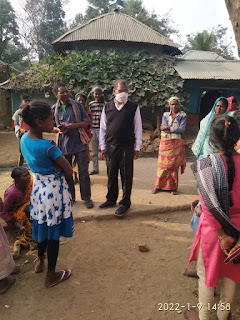PBKMS and SMS submit deputations and initiate a campaign to highlight the 'betrayal' faced by the farmers of the nation in the hands of the union government
Paschim Banga Khet Majoor Samity (PBKMS) and Shramajivee Mahila Samity (SMS) have called for a 'Day of Condemnation' or the 'Betrayal day' as christened by the associations and trade union under the banner of the All India Kisan Sangharsh Coordination Committee (AIKSSC). The union government and the political leadership at the centre have failed to honour its promises to the farmers during the withdrawal of the year-long protests. Post rollback of the three contentious farm legislations by the union government, the protesting farmers demanded concrete steps to address their other concerns as well for which they had braved the ire of the administration and the extreme climate of North India for more than a year.
We welcome the unconditional withdrawal of the three contentious farm legislations which began with the passing of the Farm Laws Repeal Bill, 2021 at the Lok Sabha culminating in the presidential assent provided on 1st December, 2021. However, the other demands of the nation wide peaceful struggle were not honoured by the political leadership at the centre and the farming community now nurses a sense of betrayal. Not even one of the promises made to the protesting farmers (apart from the repeal of the three farm legislations) to persuade them to vacate the protest sites has been taken up till date. This apathy dishonours one of the most impactful peasant movements of the recent times. We have not seen any willingness on the part of the central government to honour its commitment on a range of promises made to address concerns of the protetsing farmers. An elected government cannot disregard the demands raised by a mass movement in this manner. We vow to continue with our struggles till each and every demand of our farmers is honoured.
In West Bengal, especially the small and marginal farmers face difficulty in receiving the right price for their produces. There are also numerous barriers to selling paddy in large quantities, such as relatively distant markets, undefined pricing, the complexity of selling in government mandis, and so on. The present Trinamool Congress government had given moral support to the agitating peasants and now if the other vital demands of the peasants are not met, then some moral responsibility to address them lies with the political leadership of the state as well.
On this day, we are submitting demand charters in the form of deputations to the panchayat, block and district administrations in our field areas which are spread across West Bengal. We are placing the following demands before the State Government:
1. Declaration of minimum support price for all agricultural produces.
2. Providing access to necessary infrastructure for enabling farmers to sell agricultural products in the government mandis.
3. Speedy settlemt of arrears after the sale of paddy in government mandis.
4. In case of crop damage due to natural calamities, adequate compensation should be provided. Universal coverage of crop insurance should be ensured.
5. In order to reduce the monopoly of multinational seed corporations, necessary infrastructure should be provided for the conservation of indigenous seeds at the village level.
The following demands have been placed before the Central Government along with all the mass organizations and farmer's associations across the country:
1. Immediate announcement of the formation of committee with the objective of guaranteeing the minimum support price of all crops.
2. Fixing the minimum wage of agricultural labourers at ₹600 per day in line with the recommendations of the 7th pay commission.
3. Fabricated charges imposed on protesting farmers must be withdrawn immediately.
4. Union Minister Ajay Mishra Teni, who was responsible for the gruesome murder of farmers in Lakhimpur Khedi, should be arrested and punished through the appropriate judicial process.
We have also been able to organize a few roadshows and public meetings in the face of strict pandemic related restrictions. Our members have made efforts to adhere to the protocol(s) related to public health as laid down by the authorities. Some of the glimpses of our show of strength on the ground:






